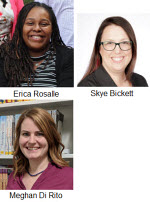
No Comments on Art, Technology, Medicine: A Winning Educational Trio 306
Erica Rosalle, Public Services Coordinator
Skye Bickett, DHSc, MLIS, AHIP, Assistant Director of Library Services
Meghan Di Rito, MLIS, Education and Outreach Librarian
PCOM Georgia
Like many of our programming ideas, the Art, Technology, Medicine (ATM) event started with a conversation about graphic novels. Because these novels enjoy a popular following as both an educational and entertainment medium, we initially decided to hold an introduction to a graphic medicine event. Not long into the planning stage for the inaugural program, we realized that we wanted to expand beyond graphic medicine. So, we set out to answer the question of how people are using creative arts, such as painting and music, or technological arts, such as video games and virtual reality, to enhance medical education, patient education, and patient care. The answer to that question is the essence of ATM.
We had a wealth of information at our fingertips in the form of faculty and staff from the departments of Physical Therapy and Medical Simulation. By collaborating with these teams and others, the seed of our idea quickly grew into an event full of displays and demonstrations of artistic and technological expression, all done with the background of medicine. Each of the four components we defined — Graphic Medicine, Art/Music Therapy, Gaming Technologies/Virtual Reality, and Stress Relief — had one or two stations displaying a particular educational or therapeutic modality.
Because interactivity breeds engagement, we put many hands-on activities into the program. At ATM 2017, participants at the Stress Relief station had the opportunity to paint rocks with designs or kind words for themselves and others. The 2018 attendees literally lent their hands to paint a unique piece of art for the Library, which serves as a visual reminder that we are here for our community. A faculty member from the Department of Physical Therapy demonstrated her research in how the Nintendo Wii balance board can improve the movement of amputees and others involved in physical therapy. Attendees were then able to use the balance board to test their own mobility and balance. The Department of Medical Simulation showed attendees how they use virtual and augmented reality to train medical students in how to take patient histories, provide emergency care, and perform laparoscopic surgery.
Feedback from attendees was very positive in both years. Attendees enjoyed the variety of different activities we provided. From an educational standpoint, it was much easier to talk to visitors at each station if they were drawn in by or engaged in an activity. We are currently brainstorming for our 2019 program. We want to include educational activities that are more interactive and link more closely to the therapeutic modalities. We are also investigating how to better assess the educational impact of the event.
If you would like to learn more about our event, please visit our ATM page: https://libguides.pcom.edu/atm


Leave a comment